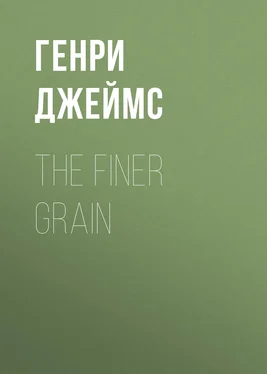Генри Джеймс - The Finer Grain
Здесь есть возможность читать онлайн «Генри Джеймс - The Finer Grain» — ознакомительный отрывок электронной книги совершенно бесплатно, а после прочтения отрывка купить полную версию. В некоторых случаях можно слушать аудио, скачать через торрент в формате fb2 и присутствует краткое содержание. Жанр: literature_19, foreign_antique, foreign_prose, foreign_sf, на английском языке. Описание произведения, (предисловие) а так же отзывы посетителей доступны на портале библиотеки ЛибКат.
- Название:The Finer Grain
- Автор:
- Жанр:
- Год:неизвестен
- ISBN:нет данных
- Рейтинг книги:4 / 5. Голосов: 1
-
Избранное:Добавить в избранное
- Отзывы:
-
Ваша оценка:
- 80
- 1
- 2
- 3
- 4
- 5
The Finer Grain: краткое содержание, описание и аннотация
Предлагаем к чтению аннотацию, описание, краткое содержание или предисловие (зависит от того, что написал сам автор книги «The Finer Grain»). Если вы не нашли необходимую информацию о книге — напишите в комментариях, мы постараемся отыскать её.
The Finer Grain — читать онлайн ознакомительный отрывок
Ниже представлен текст книги, разбитый по страницам. Система сохранения места последней прочитанной страницы, позволяет с удобством читать онлайн бесплатно книгу «The Finer Grain», без необходимости каждый раз заново искать на чём Вы остановились. Поставьте закладку, и сможете в любой момент перейти на страницу, на которой закончили чтение.
Интервал:
Закладка:
They had arrived; the high, closed porte-cochere , in its crested stretch of wall, awaited their approach; but his gesture took effect, the car pulled up at the edge of the pavement, the man, in an instant, was at the door and had opened it; quickly moving across the walk, the next moment, to press the bell at the gate. Berridge, as his hand now broke away, felt he had cut his cable; with which, after he had stepped out, he raised again the glass he had lowered and closed, its own being already down, the door that had released him. During these motions he had the sense of his companion, still radiant and splendid, but somehow momentarily suppressed, suspended, silvered over and celestially blurred, even as a summer moon by the loose veil of a cloud. So it was he saw her while he leaned for farewell on the open window-ledge; he took her in as her visible intensity of bright vagueness filled the circle that the interior of the car made for her. It was such a state as she would have been reduced to—he felt this, was certain of it—for the first time in her life; and it was he, poor John Berridge, after all, who would have created the condition.
“Good-night, Princess. I sha’n’t see you again.”
Vague was indeed no word for it—shine though she might, in her screened narrow niche, as with the liquefaction of her pearls, the glimmer of her tears, the freshness of her surprise. “You won’t come in—when you’ve had no supper?”
He smiled at her with a purpose of kindness that could never in his life have been greater; and at first but smiled without a word. He presently shook his head, however—doubtless also with as great a sadness. “I seem to have supped to my fill, Princess. Thank you, I won’t come in.”
It drew from her, while she looked at him, a long low anxious wail. “And you won’t do my Preface?”
“No, Princess, I won’t do your Preface. Nothing would induce me to say a word in print about you. I’m in fact not sure I shall ever mention you in any manner at all as long as ever I live.”
He had felt for an instant as if he were speaking to some miraculously humanised idol, all sacred, all jewelled, all votively hung about, but made mysterious, in the recess of its shrine, by the very thickness of the accumulated lustre. And “Then you don’t like me—?” was the marvellous sound from the image.
“Princess,” was in response the sound of the worshipper, “Princess, I adore you. But I’m ashamed for you.”
“Ashamed–?”
“You are Romance—as everything, and by what I make out every one, about you is; so what more do you want? Your Preface—the only one worth speaking of—was written long ages ago by the most beautiful imagination of man.”
Humanised at least for these moments, she could understand enough to declare that she didn’t. “I don’t, I don’t!”
“You don’t need to understand. Don’t attempt such base things. Leave those to us. Only live. Only be. We’ll do the rest.”
She moved over—she had come close to the window. “Ah, but Mr. Berridge–!”
He raised both hands; he shook them at her gently, in deep and soft deprecation. “Don’t sound my dreadful name. Fortunately, however, you can’t help yourself.”
“Ah, voyons! I so want–!”
He repeated his gesture, and when he brought down his hands they closed together on both of hers, which now quite convulsively grasped the window-ledge. “Don’t speak, because when you speak you really say things—!” “You are Romance,” he pronounced afresh and with the last intensity of conviction and persuasion. “That’s all you have to do with it,” he continued while his hands, for emphasis, pressed hard on her own.
Their faces, in this way, were nearer together than ever, but with the effect of only adding to the vividness of that dire non-intelligence from which, all perversely and incalculably, her very beauty now appeared to gain relief. This made for him a pang and almost an anguish; the fear of her saying something yet again that would wretchedly prove how little he moved her perception. So his eyes, of remonstrant, of suppliant intention, met hers close, at the same time that these, so far from shrinking, but with their quite other swimming plea all bedimmed now, seemed almost to wash him with the tears of her failure. He soothed, he stroked, he reassured her hands, for tender conveyance of his meaning, quite as she had just before dealt with his own for brave demonstration of hers. It was during these instants as if the question had been which of them could most candidly and fraternally plead. Full but of that she kept it up. “Ah, if you’d only think, if you’d only try–!”
He couldn’t stand it—she was capable of believing he had edged away, excusing himself and trumping up a factitious theory, because he hadn’t the wit, hadn’t the hand, to knock off the few pleasant pages she asked him for and that any proper Frenchman, master of the metier , would so easily and gallantly have promised. Should she so begin to commit herself he’d, by the immortal gods, anticipate it in the manner most admirably effective—in fact he’d even thus make her further derogation impossible. Their faces were so close that he could practise any rich freedom—even though for an instant, while the back of the chauffeur guarded them on that side and his own presented breadth, amplified by his loose mantle, filled the whole window-space, leaving him no observation from any quarter to heed, he uttered, in a deep-drawn final groan, an irrepressible echo of his pang for what might have been, the muffled cry of his insistence. “You are Romance!”—he drove it intimately, inordinately home, his lips, for a long moment, sealing it, with the fullest force of authority, on her own; after which, as he broke away and the car, starting again, turned powerfully across the pavement, he had no further sound from her than if, all divinely indulgent but all humanly defeated, she had given the question up, falling back to infinite wonder. He too fell back, but could still wave his hat for her as she passed to disappearance in the great floridly framed aperture whose wings at once came together behind her.
A ROUND OF VISITS
I
HE had been out but once since his arrival, Mark Monteith; that was the next day after—he had disembarked by night on the previous; then everything had come at once, as he would have said, everything had changed. He had got in on Tuesday; he had spent Wednesday for the most part down town, looking into the dismal subject of his anxiety—the anxiety that, under a sudden decision, had brought him across the unfriendly sea at mid-winter, and it was through information reaching him on Wednesday evening that he had measured his loss, measured above all his pain. These were two distinct things, he felt, and, though both bad, one much worse than the other. It wasn’t till the next three days had pretty well ebbed, in fact, that he knew himself for so badly wounded. He had waked up on Thursday morning, so far as he had slept at all, with the sense, together, of a blinding New York blizzard and of a deep sore inward ache. The great white savage storm would have kept him at the best within doors, but his stricken state was by itself quite reason enough.
He so felt the blow indeed, so gasped, before what had happened to him, at the ugliness, the bitterness, and, beyond these things, the sinister strangeness, that, the matter of his dismay little by little detaching and projecting itself, settling there face to face with him as something he must now live with always, he might have been in charge of some horrid alien thing, some violent, scared, unhappy creature whom there was small joy, of a truth, in remaining with, but whose behaviour wouldn’t perhaps bring him under notice, nor otherwise compromise him, so long as he should stay to watch it. A young jibbering ape of one of the more formidable sorts, or an ominous infant panther, smuggled into the great gaudy hotel and whom it might yet be important he shouldn’t advertise, couldn’t have affected him as needing more domestic attention. The great gaudy hotel—The Pocahontas, but carried out largely on “Du Barry” lines—made all about him, beside, behind, below, above, in blocks and tiers and superpositions, a sufficient defensive hugeness; so that, between the massive labyrinth and the New York weather, life in a lighthouse during a gale would scarce have kept him more apart. Even when in the course of that worse Thursday it had occurred to him for vague relief that the odious certified facts couldn’t be all his misery, and that, with his throat and a probable temperature, a brush of the epidemic, which was for ever brushing him, accounted for something, even then he couldn’t resign himself to bed and broth and dimness, but only circled and prowled the more within his high cage, only watched the more from his tenth story the rage of the elements.
Читать дальшеИнтервал:
Закладка:
Похожие книги на «The Finer Grain»
Представляем Вашему вниманию похожие книги на «The Finer Grain» списком для выбора. Мы отобрали схожую по названию и смыслу литературу в надежде предоставить читателям больше вариантов отыскать новые, интересные, ещё непрочитанные произведения.
Обсуждение, отзывы о книге «The Finer Grain» и просто собственные мнения читателей. Оставьте ваши комментарии, напишите, что Вы думаете о произведении, его смысле или главных героях. Укажите что конкретно понравилось, а что нет, и почему Вы так считаете.












